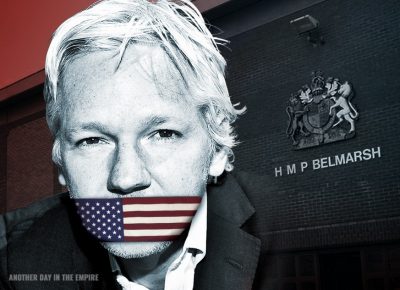Julian Assange Is a Conscientious Objector. Time Will Vindicate Him.
The US is using its enormous power to compel a guilty verdict under charges under the espionage act.

It seems impossible to ignore Julian Assange today, but the press is united in wilful ignorance of his plight. The dearth of stories about his show trial in a kangaroo court in London is evident. It has never been easier to bury a dissident. At a time when the criminalization of journalism is inescapable, there has never been less reporting on it.
Julian Assange is an emblem of the struggle for justice in wartime. He is fighting the good old fight for liberty and against imperial oppression. The law, in administrating his case, has failed its own benchmark of justice, and democracy has suffered, not least in the UK, where the ostensibly independent judiciary has been politicised by the US national security state.
The pieties of the American empire have been asserted to marginalise Assange, and they have allowed for an obfuscation, a barrier to the public understanding the charges and what they mean. In sum, the work for which Assange is being prosecuted is in the tradition of conscientious objection to imperial war, and the US is responding as barbarically as did the British state during world war one towards its dissenting citizens.
The US is using its enormous power to compel a guilty verdict under charges under the espionage act and prevent Assange’s vindication as a journalist. Assange is being prosecuted for journalism intended to embarrass the US establishment on the world stage. His enterprise as a journalist has been distorted into criminal activity by the Wikileaks Grand Jury.
The military-intelligence complex has excised extreme powers of manipulation over the public debate on Assange, malignantly influencing the public’s perception of his trial. Playing fast and loose with the truth that it is in fact a non-partisan pacifist research institute, the diktat that Wikileaks is a “hostile intelligence service” working at the behest of Russia has become establishment wisdom. The Machiavellian politics of neo-conservative Washington has led to a realpolitik that equates Wikileaks with Kremlin-backed cyber terrorism.
Those arbitrating over Assange’s destiny and driving the narrative about Wikileaks being terrorists are the same networks of people who stand to lose their privileges with classified leaks. Wikileaks threatens the centralised concentration of ownership of sensitive information in an ossified national security elite that lies to, defrauds the public and undermines the constitution. The political changes in America in the aftermath of 9/11 saw the country adopt many illiberal policies. The changes allowed for the Stalinisation of US policy. While the democratic ideal defends relaxed, minimal controls on free expression, the neoconservative war state proliferated repressive legislation designed to control public debate and secure the total authority of state-approved thought. As a result there is a dearth of genuine critical thinking in America’s media landscape, as well as a citizenry under duress of official propaganda.
Over the last decade, a number of western broadcasters and news outlets have embarked on a process of capitulating their freedoms of expression to the malignant authority of the intelligence community. Most are doing this by inviting editorial oversight from the intelligence agencies, and through obedience to what are called D-notices, restrictions on reporting on certain subjects the military deems sensitive. Licence to free expression remains the exclusive preserve of an army of citizen journalists, who expose the cartel media’s betrayal of press philosophy by uncompromisingly abiding by first amendment ethics.
The result is that online, there is a vibrant, eclectic culture of citizen media, which does more for public interest journalism than the mainstream media has in its entire career. The ethical hallmark and pinnacle for these citizen journalists is Wikileaks, either directly or indirectly inspired by its revolutionising of the public’s right to know.
For the public citizen press that evades corporate control, governments have resorted to technological censorship, controlling the platforms these dissidents can reach online. Mainstream media organisations cannot survive without a rigged system that gives them privileged access to the pliable minds of citizens. Citizen journalists by contrast are forced to build their own audiences from scratch. The superiority of citizen media derives from the relative independence of its practitioners compared to mainstream journalists, who are under the spell of op-ed policy determined by corporate owners.
Against this background of political and economic vulnerability, citizen journalism nevertheless holds a great deal of promise for subverting state control of narrative and information.
This shift in media may have a direct effect on how the public participate in politics. The internet as a vast knowledge distribution network helps drive up citizen’s efficacy by exposing them to the fullest range of information they need to come to an informed choice on politics and policy. Citizen media also provides a freethinking alternative to national news that is often focused on psychological operations.
Wikileaks plays an important role in democratic life. By exposing scandals elites would rather be kept secret, it honors the founding principles of the fourth estate to protect citizens against abuses of power.
Assange represents the struggle for fundamental rights to free expression and access to information.
As democrats and public intellectuals who study the life and times of democracy, we want to know that public interest journalism is protected against the sinister encroachments of the state. The Assange issue is one that defies the effects of polarisation, everybody can unite behind the first amendment. A journalist is suffering in torturous conditions for the crime of doing his job. We assess that this is injustice, and commit as a collective to his liberation.
*
Note to readers: please click the share buttons above or below. Forward this article to your email lists. Crosspost on your blog site, internet forums. etc.
Megan Sherman is a frequent contributor to Global Research.
Featured image is from Another Day in the Empire

